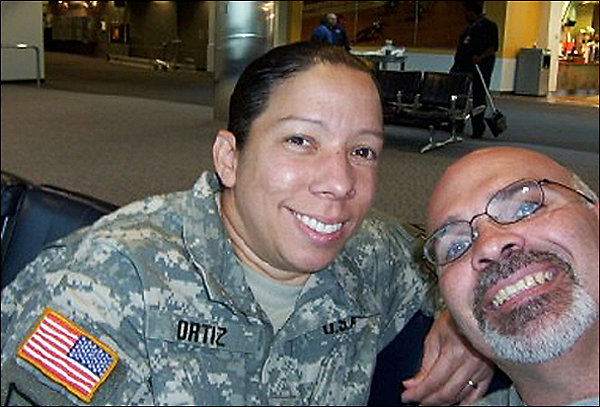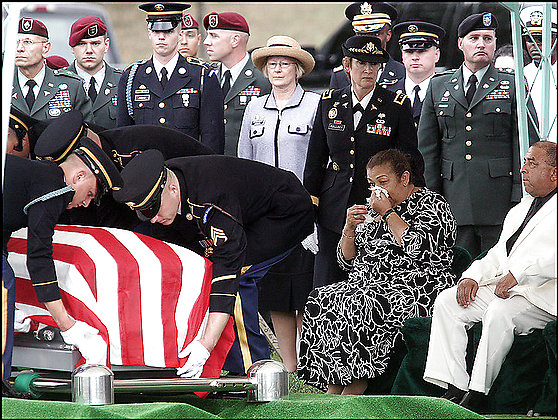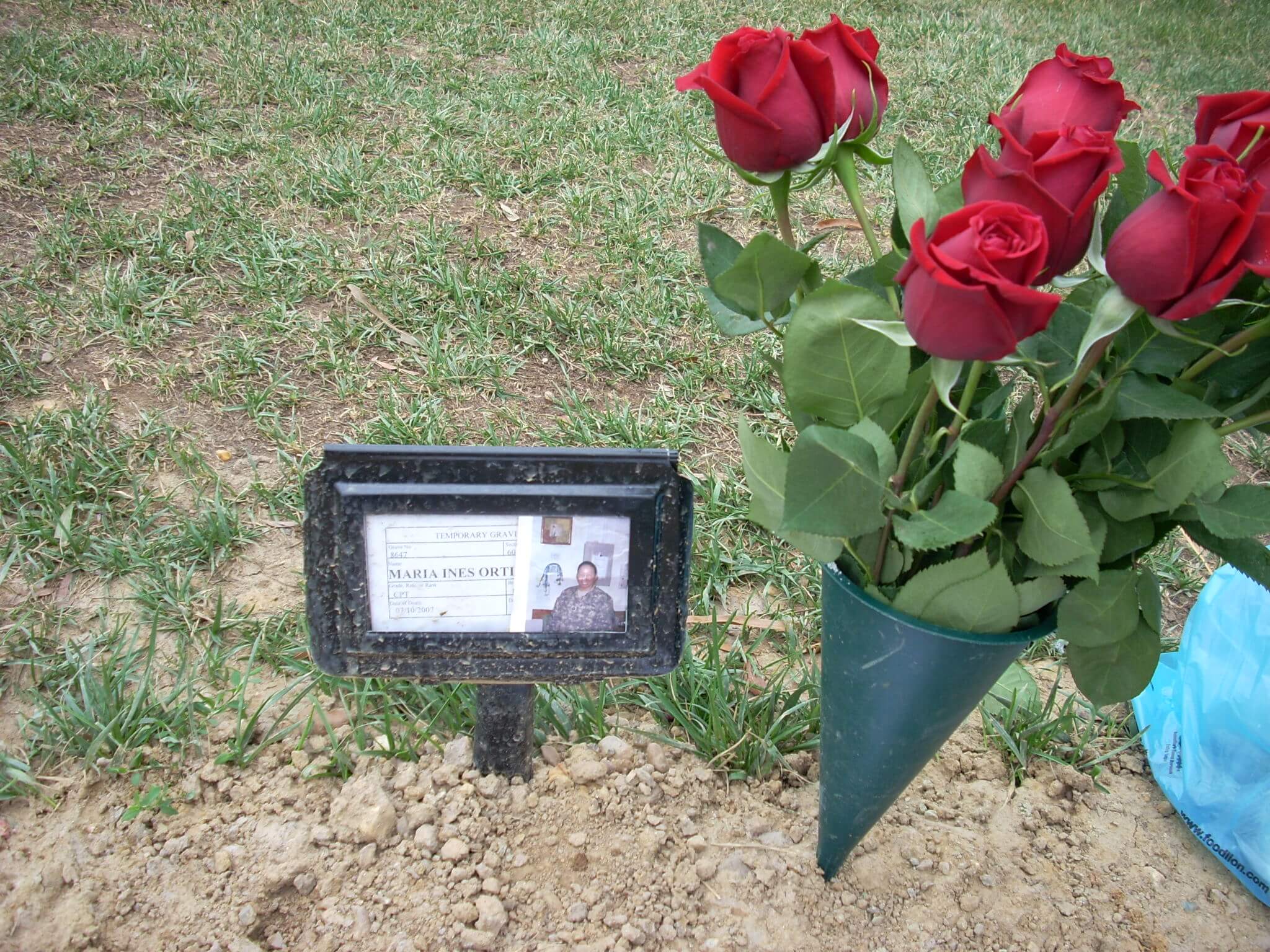U.S. Department of Defense
Office of the Assistant Secretary of Defense (Public Affairs)
News Release
IMMEDIATE RELEASE No. 872-07
July 12, 2007
DoD Identifies Army Casualty
The Department of Defense announced today the death of a soldier who was supporting Operation Iraqi Freedom.
Captain Maria I. Ortiz, 40, of Bayamon, Puerto Rico, died July 10, 2007, in Baghdad, Iraq, of wounds suffered from enemy indirect fire. She was assigned to the Kirk U.S. Army Health Clinic, Aberdeen Proving Ground, Maryland.
Popular Army Nurse Is the First Killed in Combat Since Vietnam
By Steve Vogel
Courtesy of the Washington Post
Tuesday, July 17, 2007
Captain Maria Ines Ortiz had a smile that lighted up the hallways in every hospital where she worked, from Aberdeen to Walter Reed to Iraq.
When a patient needed extra care, the Army nurse would stay late. If a colleague was feeling blue, she was there.
-
Captain Maria Ines Ortiz, 40, of Edgewood, Maryland, was struck by shrapnel in Baghdad. (Family Photo)
Ortiz, 40, was killed last week by a mortar attack in the Green Zone in Baghdad. The Edgewood, Maryland, resident is the first Army nurse killed in combat since the Vietnam War, Major General Gale Pollock, the Army’s acting Surgeon General, said in an interview yesterday.
“Having one of the family go down is very, very hard,” said Pollock, who also is a nurse. “You feel like a piece of your heart is gone.”
Ortiz was returning from physical training July 10, 2007, when she was caught outside by a barrage of mortar shells. She was killed by shrapnel.
“If there was such a thing as the jewel of the clinic, she was the jewel,” said Renee Smith, who worked with Ortiz at an Army health clinic at Aberdeen Proving Ground in Maryland. “Her work wasn’t finished until everybody was cared for.”
Ortiz’s death has hit hard at Aberdeen, where she served as chief nurse at the Kirk U.S. Army Health Clinic for 18 months before going to Iraq last fall. Many broke down in tears when the clinic commander called everyone together and told the news.
“It really took everybody by surprise,” Smith said. “God, it’s a great loss.”
Patients who knew Ortiz have “run in here in disbelief,” said Maj. Kathy Presper, chief of medical management at Kirk. “She was dedicated, a step-up-to-the-plate type person.”
At Walter Reed Army Medical Center, where Ortiz served from 2001 to 2003 as a dialysis nurse, Medical Command officials are considering whether to honor her by naming a building or clinic in her memory.
“She has many admirers and friends,” Major General Eric Schoomaker, the hospital commander, said yesterday.
Ortiz volunteered for duty in Iraq and was eager to go do her part, colleagues said. “She was very proud of the fact that she was going to go over to take care of soldiers,” said Wanda Schuler, a co-worker at Aberdeen.
When Schuler sent an e-mail asking Ortiz whether she needed anything, Ortiz asked her to send Christmas decorations she could use to brighten up the halls at the Army’s 28th Combat Support hospital, where she was assigned. “While she was caring for patients physically, she was caring for them emotionally, too,” Schuler said. “She tried to make it as cheery as possible.”
Ortiz was home on two weeks’ leave recently and paid a visit to the clinic at Aberdeen. “She said it was going well, and she felt like she was making a difference there,” Smith recalled.
Colleagues at the Baghdad hospital held a memorial service for Ortiz soon after her death. “They gathered together, and they talked about how she touched their lives,” Pollock said.
Ortiz, who was born in New Jersey and grew up in Puerto Rico, joined the service as an enlisted soldier with the Army Reserve in Puerto Rico in 1991, and she became active duty in 1993. She was commissioned as an officer in 1999.
Ortiz was engaged to be married to Juan Casiano upon her return from Iraq, friends said.
A memorial service for Ortiz is set for tomorrow at the Aberdeen clinic. A date for burial at Arlington National Cemetery has not been set, cemetery spokeswoman Kara McCarthy said.
Nurse death reflects new female roles
Friday, July 20, 2007
BY JONATHAN CASIANO AND WAYNE WOOLLEY
Courtesy of the Star-Ledger
Captain Maria Ines Ortiz, a New Jersey native and the first military nurse killed by hostile fire since the Vietnam War, will be buried with full honors at Arlington National Cemetery, a military spokeswoman said yesterday.
The Army’s top medical officer, Major General Gale Pollock, is expected to attend the burial ceremony for Ortiz, who was assigned to a combat surgical hospital in Baghdad and killed July 10 by an insurgents’ mortar. The burial is scheduled for August 9, 2007.
“Having one of the family go down is very, very hard,” Pollock, who is also a nurse, said in a statement. “You feel like a part of your heart is gone.”
The death of Ortiz, who has been described as a tireless patient advocate with an infectious smile, represents a paradox in the war. Although she was the first female nurse to die in combat in Iraq, 71 other women in specialties ranging from military police officers to truck drivers have been killed there since the U.S. invaded the country in March 2003. Eight female service members have died in Afghanistan since that invasion in 2001.
In America’s previous wars, nurses were generally the only women to die.
“In World War II and Vietnam, there were really no other military specialties open to women,” said Lori Manning, a retired Navy captain and director of the military project at the Women’s Research and Education Institute in Washington, D.C. “Practically the only women allowed in the combat zone were nurses.”
In Vietnam, eight nurses died in the line of duty, including Captain Eleanor Grace Alexander, who lived in River Vale in northern Bergen County before volunteering for the Army. She died in a helicopter crash. During World War II, more than a dozen American nurses were killed and more than 75 taken prisoner.
Elizabeth Norman, a nurse and humanities professor at New York University who has written two books about military nurses, said the women who served in World War II and Vietnam were pioneers.
“They wanted to get out of their hometowns, get out of the roles they saw women living there,” Norman said. “And when they came home, particularly the Vietnam women, they agitated to expand opportunities for women in the military.”
This expansion began in the late 1970s when the Women’s Army Corps was disbanded and its soldiers folded into the regular Army. By the time of the Persian Gulf War in 1991, women were allowed into nearly every specialty except those involved in direct ground combat — infantry, armor, the special forces and short-range artillery.
That war, the first America fought with women able to serve in nearly all of their current military specialties, did little to highlight the new dangers women faced on the battlefield despite the fact nearly 40,000 deployed. Six women were killed in the conflict, two in vehicle crashes and four during a missile attack on a dining hall.
The true impact of the changes were not immediately apparent in the first three years of the war in Afghanistan either. The three women to die in that span perished in air crashes.
In Iraq, however, women were under fire from the start. Less than 72 hours after the invasion began, Private First Class Lori Ann Piestewa was killed and Private First Class Jessica Lynch taken prisoner when their supply convoy was attacked in Nasiriya. Since then, women serving in Iraq have been killed by mortars, grenades, snipers, suicide bombers and as they worked to defuse roadside bombs.
In early 2005, Representative Duncan Hunter (R-California) questioned whether the Pentagon was violating its own rules by putting too many women in the line of fire in Iraq. But debate in the House Armed Services Committee ended after then-Secretary of Defense Donald Rumsfeld said too many limits on what female troops’ duties in Iraq would have an immediate and detrimental effect on the war effort.
The rules under discussion went beyond prohibitions against women holding combat specialties, such as infantry. Women are technically not supposed to be stationed with combat units smaller than a brigade, or about 3,500 troops.
Manning says the policy has been all but impossible to enforce because of the locations of American military outposts in Iraq and the fact that all troops are targets for insurgents.
“The line has gotten really fuzzy over there,” she said.
So far, however, the policies separating women from certain kinds of units appear to have offered some protection for female medics. Only male medics are sent into the field with ground combat units. None of the nearly 100 medics who have died in Iraq so far have been women.
In the death of Ortiz, the nurse from New Jersey, none of these protections would have made a difference. She was assigned to a surgical hospital inside the fortified Green Zone in Baghdad. She was off duty and walking outdoors when the mortar struck, her family said.
Ortiz, who was born in Camden and grew up in Puerto Rico, enlisted in the Army in 1991. Her first military job was laying military communication cables for the Signal Corps. She was assigned to South Korea when she met her fiancé, Juan Casiano.
“She had this smile, this aura,” said Casiano, who has since retired from the military. “She wanted to make sure she got to know you and wanted to make sure you enjoyed her company.”
Ortiz was working at Walter Reed Army Medical Center in Washington when she met Casiano again. The friends hadn’t seen each other in years and soon their relationship took a romantic turn.
‘She was a new professional in the military. She had her bars,” Casiano said. “But when she saw me she was so gracious. She said ‘You showed me the way, I’ll never forget you.’ And things just started going from there.”
Ortiz was eventually reassigned to Aberdeen Proving Ground in Maryland and was stationed there when she deployed to Iraq in September. She and Casiano planned to get married when she returned.
Casiano said he has taken solace in the fact his fiancée died carrying out a mission she believed she was destined to fulfill. The day before her death, she e-mailed Casiano a prayer that talked about finding closure and acceptance in life. She told him to read it and that she would later explain what it meant. She was killed before she got that chance.
Casiano thinks he knows what she was trying to tell him.
“She had a calling,” he said.
Captain Is First Army Nurse Casualty Since Vietnam
By Mark Berman
Courtesy of theWashington Post
Friday, August 10, 2007
Captain Maria I. Ortiz was buried yesterday at Arlington National Cemetery, nearly a month after she was killed in the Green Zone in Baghdad, the first Army nurse to die in combat since the Vietnam War.
Ortiz, 40, of Bayamon, Puerto Rico, was killed July 10, 2007, by enemy fire, the Defense Department reported. She was caught in a mortar attack while returning from physical training.
-
Iris Santiago and Jorge Ortiz, seated, mourn the loss of their daughter, Army Captain Maria I. Ortiz
A horse-drawn caisson brought Ortiz, the 357th person killed in Iraq to be buried at Arlington, to her grave. More than 250 people piled out of cars and buses to pay their respects.
Sweltering heat gave way to cooling gusts, and before long the sky darkened and began to pelt the mourners with rain. Some of them took refuge under an overhang, and some ducked under umbrellas.
But the mourners focused on the seven riflemen firing off three shots apiece. They focused on the sounds of taps barely audible in the rain. They focused on honoring Ortiz as her parents, Jorge Ortiz and Iris Santiago, were handed folded flags by Major General Gale S. Pollock, the Army’s acting Surgeon General and a nurse herself.
Ortiz volunteered to go to Iraq, leaving in September after 18 months as the chief nurse at the Kirk U.S. Army Health Clinic at Aberdeen Proving Ground in Maryland.
“She really felt that while what she was doing here was important, she felt as though she needed to go over there, because she wanted to take care of our soldiers and the people of Iraq and the coalition soldiers,” said Wanda Schuler, who worked with Ortiz at the Kirk clinic.
Ortiz was born in New Jersey but grew up in Puerto Rico. She enlisted with the Army Reserve in 1991, going on active duty in 1993. In 1999, she was commissioned an officer.
“Everything she did, she always had a smile. Even if she had a bad day, she always had a smile,” Schuler said. “The entire clinic was devastated.”
New Jersey Governor Jon S. Corzine (D) recognized her “patriotism and dedicated service to her country and her fellow soldiers” in an executive order as flags in the state were flown at half-staff Monday to honor Ortiz. Her mother and one of her sisters live in the state.
Ortiz also served in the Army in Honduras and South Korea and was a dialysis nurse at Walter Reed Army Medical Center from 2001 to 2003.
“If there was such a thing as the jewel of the clinic, she was the jewel,” Renee Smith, who worked with Ortiz at Kirk, told The Post last month. “Her work wasn’t finished until everybody was cared for.”
Schuler kept in touch with Ortiz via e-mail after the latter left for Iraq. When the clinic commander informed people at Kirk what had happened, Schuler posted a picture of her friend on her bulletin board.
“It might sound quirky, but I say good morning to her every day,” she said. “She was such a warm, wonderful person. She is someone who you will never forget.”
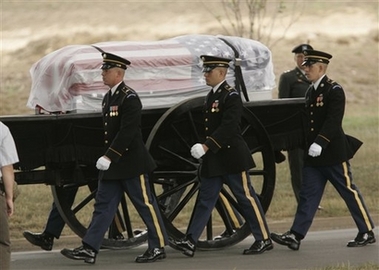
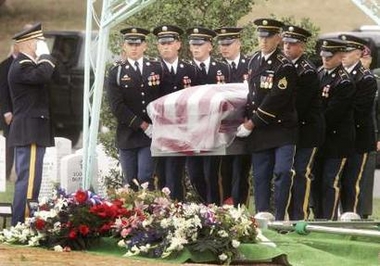
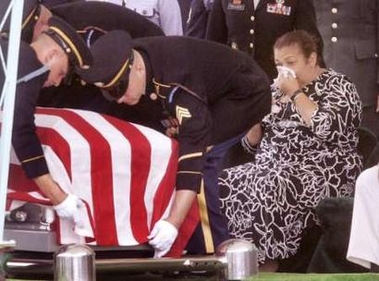
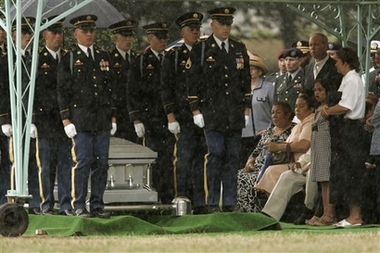
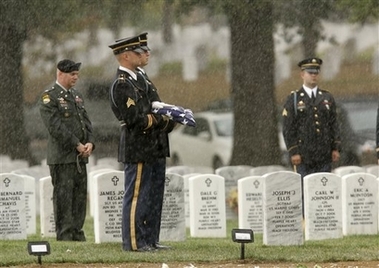
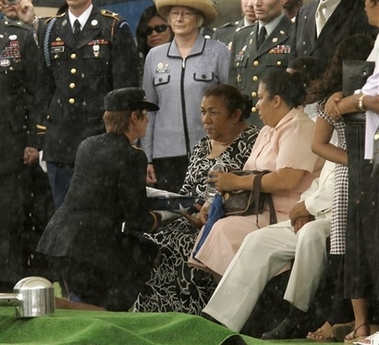
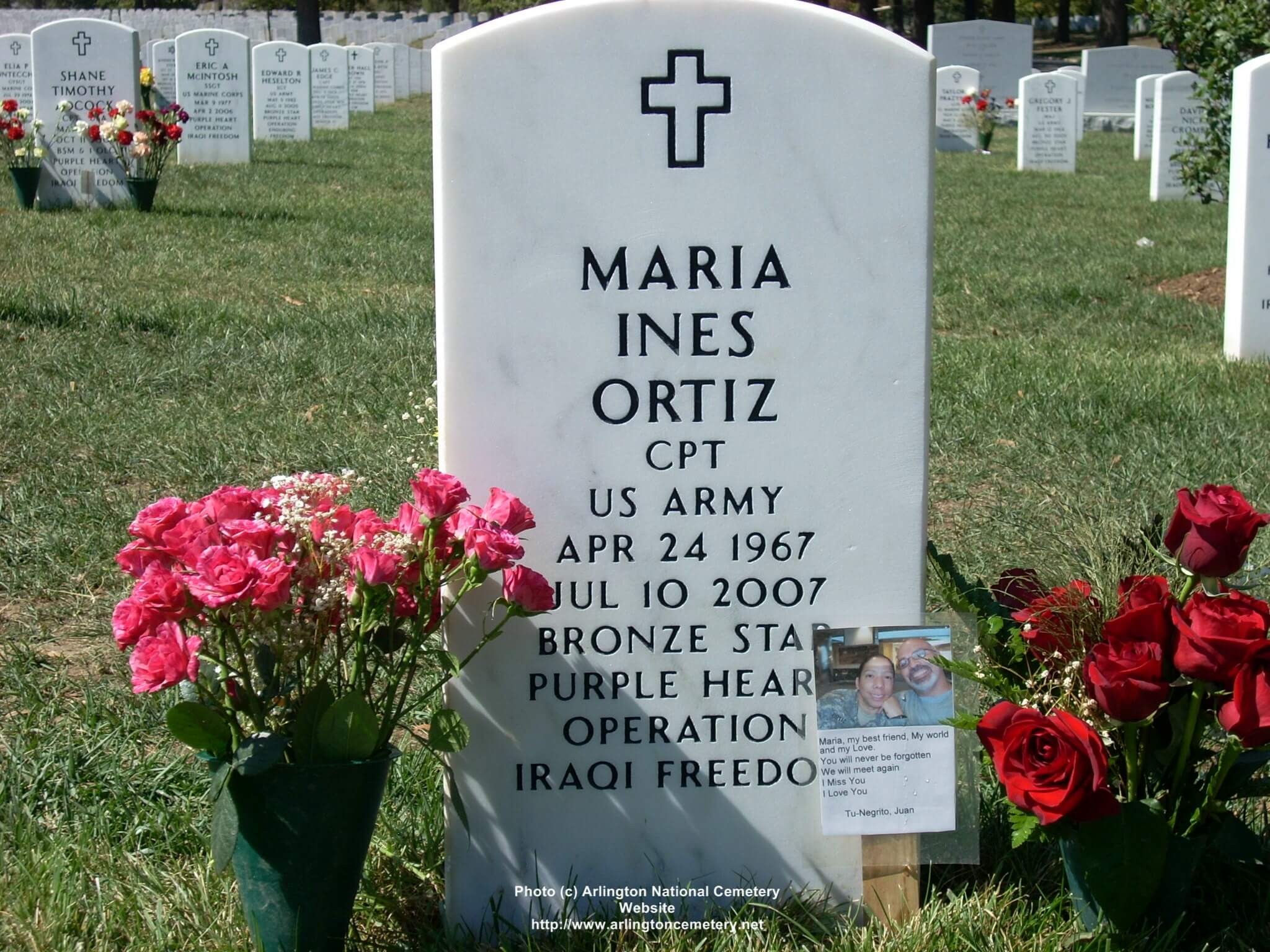
Michael Robert Patterson was born in Arlington and is the son of a former officer of the US Army. So it was no wonder that sooner or later his interests drew him to American history and especially to American military history. Many of his articles can be found on renowned portals like the New York Times, Washingtonpost or Wikipedia.
Reviewed by: Michael Howard

